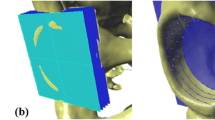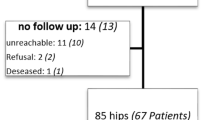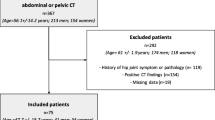Abstract
Appropriate anatomic concepts for surgery to treat femoroacetabular impingement require a precise appreciation of the native acetabular anatomy. We therefore determined (1) the spatial acetabular rim profile, (2) the topography of the articular lunate surface, and (3) the 3-D relationships of the acetabular opening plane comparing 66 bony acetabula from 33 pelves in female and male pelves. The acetabular rim profile had a constant and regular wave-like outline without gender differences. Three prominences anterosuperiorly, anteroinferiorly and posteroinferiorly extended just above hemispheric level. Two depressions were below hemispheric level, of 9° at the anterior wall and of 21° along the posterosuperior wall. In 94% of all acetabula, the deepest extent of the articular surface was within 30° of the anterosuperior acetabular sector. In 99% of men and in 91% of women, the depth of the articular surface was at least 55° along almost half of the upper acetabular cup. The articular surface was smaller in women than in men. The acetabular opening plane was orientated in 21° ± 5° for version, 48° ± 4° for inclination and 19° ± 6° for acetabular tilt with no gender differences. We defined tilt as forward rotation of the entire acetabular cup around its central axis; because of interindividual variability of acetabular tilt, descriptions of acetabular lesions during surgery, CT scanning and MRI should be defined and recorded in relation to the acetabular notch. Acetabular tilt and pelvic tilt should be separately identified. We believe this information important for surgeons performing rim trimming in FAI surgery or performing acetabular osteotomies.





Similar content being viewed by others
References
Anda S, Svenningsen S, Dale LG, Benum B. The acetabular sector angle of the adult hip determined by computed tomography. Acta Radiol Diagn. 1986;27:443–447.
Anda S, Svenningsen S, Grontved T, Benum B. Pelvic inclination and spatial orientation of the acetabulum: a radiographic, computed tomographic and clinical investigation. Acta Radiol. 1990;31:389–394.
Beck M, Leunig M, Parvizi J, Boutier V, Wyss D, Ganz R. Anterior femoral impingement: part II. Midterm results of surgical treatment. Clin Orthop Relat Res. 2004;418:67–73.
Beck M, Kalhor M, Leunig M, Ganz R. Hip morphology influences the pattern of damage to the acetabular cartilage. J Bone Joint Surg Br. 2005;87:12–18.
Bullough P, Goodfellow J, Greenwald AS, O’Connor J. Incongruent surfaces in the human hip joint. Nature. 1968;217:1290.
Byers PD, Contepomi A, Farkas TA. A post-mortem study of the hip joint. Ann Rheum Dis. 1970;29:15–31.
Clark JM, Freeman MAR, Witham D. The relation of neck orientation to the shape of the proximal femur. J Arthroplasty. 1987;2:99–109.
Cohen J. Statistical power analysis for the behavioral sciences. Hillsdale, N.J.: L. Erlbaum Associates, 1988: 16–18.
Daskalogiannaki ME, Gurtsoyannis NC. Variation in the appearance of the normal sacroiliac joint on pelvic CT. Clin Radiol. 1998;53:742–746.
DiGioia A, Hafez MA, Jaramaz B, Levinson TJ, Moody JE. Functional pelvic orientation measured from lateral standing and sitting radiographs. Clin Orthop Relat Res. 2006;453:272–276.
Dora C, Zurbach J, Hersche O, Ganz R. Pathomorphological characteristics of posttraumatic acetabular dysplasia. J Orthop Trauma. 2000;14:483–489.
Eckman K, Hafez MA, Ed F, Jaramaz B, Levison TJ, DiGioia AM 3rd. Accuracy of pelvic flexion measurements from lateral radiographs. Clin Orthop Relat Res. 2006;451:154–160.
Eckstein F, von Eisenhart-Rothe R, Landgraf J, Adam C, Loehe F, Müller-Gerbl M, Putz R. Quantitative analysis of incongruity, contact areas and cartilage thickness in the human hip joint. Acta Anatomica. 1997;158:192–204.
Effenberger H, Koebke J, Wilke R, Hautmann J, Witzel U, Imhof M, Richolt J. Acetabular shape and cementless cups. Comparison of osteoarthritic hips and implant design [in German]. Orthopäde. 2004;33:1042–1050.
Eijer H, Myers SR, Ganz R. Anterior femoroacetabular impingement after femoral neck fractures. J Orthop Trauma. 2001;15:475–481.
Faflia CP, Prassopoulos PK, Daskalogiannaki ME, Gourtsoyannis NC. Variation in the appearance of the normal sacroiliac joint on pelvic CT. Clin Radiol. 1998;53:742–746.
Falliner A, Hahne HJ, Hassenpflug J. Sonographic investigation of anatomic specimens of infant hip joints. J Pediatr Orthop Br. 2002;11:192–203.
Ganz R, Gill TJ, Gauthier E, Ganz K, Krugel N, Berlemann U. Surgical dislocation of the adult hip: a technique with full access to the femoral head and acetabulum without the risk of avascular necrosis. J Bone Joint Surg Br. 2001;83:1119–1124.
Ganz R, Klaue K, Vinh TS, Mast JW. A new periacetabular osteotomy for the treatment of hip dysplasia: Technique and preliminary results. Clin Orthop Relat Res. 1988;232:26–36.
Ganz R, Leunig M, Leunig-Ganz K, Harris WH: The etiology of osteoarthritis of the hip. Clin Orthop Rel Res. 2008;466:264–272.
Ganz R, Parvizi J, Beck M, Leunig M, Nötzli H, Siebenrock KA. Femoroacetabular impingement-a cause for osteoarthritis of the hip. Clin Orthop Relat Res. 2003;417:112–120.
Gekeler J. Coxarthrosis with a deep acetabulum (proceedings) [in German]. Z Orthop Ihre Grenzgeb. 1978;116:454–459.
Giori NJ, Trousdale RT. Acetabular retroversion is associated with osteoarthritis of the hip. Clin Orthop Relat Res. 2003;417:263–269.
Goodman DA, Feighan JF, Smith AD, Latimer B, Buly RL, Cooperman DR. Subclinical slipped capital femoral epiphysis: relation to osteoarthritis of the hip. J Bone Joint Surg Am. 1997;79:1489–1497.
Gu D, Dai K, Wang Y, Hu X, Xi J. Morphologic features of the acetabulum bone joint area [in Chinese]. J Biomed Eng. 2003;20:618–621.
Ito K, Leunig M, Ganz R. Histopathologic features of the acetabular labrum in femoroacetabular impingement. Clin Orthop Relat Res. 2004;429:262–271.
Ito K, Minka MA 2nd, Leunig M, Werlen S, Ganz R. Femoro-acetabular impingement and the cam effect: an MRI-based quantitative anatomic study of the femoral head-neck offset. J Bone Joint Surg Br. 2001;83:171–176.
Jamali AA, Mladenov K, Meyer DC, Martinez A, Beck M, Ganz R, Leunig M. Anteroposterior pelvic radiographs to assess acetabular retroversion: high validity of the “cross-over-sign”. J Orthop Res. 2007;25:758–765.
Kalberer F, Sierra RJ, Madan SS, Ganz R, Leunig M. Projection of the ischial spine into the pelvic cavity: a new sign for acetabular retroversion on plain radiographs. Clin Orthop Relat Res. 2008;466:677–683.
Kloen P, Leunig M, Ganz R. Early lesions of the labrum and the acetabular cartilage in osteonecrosis of the femoral head. J Bone Joint Surg Br. 2002;84:66–69.
Lavigne M, Parvizi J, Beck M, Siebenrock K, Ganz R, Leunig M. Anterior femoroacetabular impingement: part I. Techniques of joint preserving surgery. Clin Orthop Rel Res. 2004;418:61–66.
Lazennec JY, Charlot N, Gorin M, Roger B, Arafat N, Bissery A, Saillant G. Hip spine relationship: a radio-anatomical study for optimization in acetabular cup positioning. Surg Radiol Anat. 2004;26:136–144.
Lembeck B, Mueller O, Reize P, Wuelker N. Pelvic tilt makes acetabular cup navigation inaccurate. Acta Orthop. 2005;76:517–523.
Lequesne M. Mesure des angles fondamentaux de la hanche radiographique de l’adulte par un rapporteur combine. Rev Rhum. 1963;30:479–485.
Leunig M, Beck M, Woo A, Dora C, Kerboull M, Ganz R. Acetabular rim degeneration: a constant finding in the aged hip. Clin Orthop Relat Res. 2003;413:201–207.
Leunig M, Cassillas MM, Hamlet M, Herrsche O, Nötzli T, Ganz R. Slipped capital femoral epiphysis: early mechanical damage to the acetabular cartilage by a prominent femoral metaphysis. Acta Orthop Scand. 2000;71:370–375.
Leunig M, Podeszwa D, Beck M, Werlen S, Ganz R. Magnetic resonance arthrography of labral disorders in hips with dysplasia and impingement. Clin Orthop Relat Res. 2004;418:74–80.
Leunig M, Werlen S, Ungersbock A, Ito K, Ganz R. Evaluation of the acetabular labrum by MR arthrography. J Bone Joint Surg Br. 1997;79:230–234.
Locher S, Werlen S, Leunig M, Ganz R. Inadequate detectability of early stages of coxarthrosis with conventional roentgen images [in German]. Z Orthop Ihre Grenzgeb. 2001;139:70–74.
Maruyama M, Feinberg JR, Capello WN, D’Antonio JA. The Frank Stinchfield Award: Morphologic features of the acetabulum and femur. Clin Orthop Relat Res. 2001;393:52–65.
McKibbin B. Anatomical factors in the stability of the hip joint in the newborn. J Bone Joint Surg Br. 1970;52:148–159.
Menschik F. The hip joint as a conchoid shape. J Biomechanics. 1997;30:971–973.
Meunier P, Lefèvre C, Le Saout J, Kerboul B, Riot O, Meriot P, Courtois B, Bellet M. Measurement of anteversion of cotyle. A simple method using a frontal radiograph of the hip [in French]. J Radiol. 1987;68:799–804.
Millis BM, Murphy SB, Poss R: Osteotomies about the hip for the prevention and treatment of osteoarthrosis. J Bone Joint Surg Am. 1995;77:626–647.
Murphy S, Tannast M, Kim Y-J, Buly R, Millis MB: Debridement of the adult hip for femoroacetabular impingement. Indications and preliminary clinical results. Clin Orthop Rel Res. 2004;429:178–181.
Murray DW. The definition and measurement of acetabular orientation. J Bone Joint Surg Br. 1993;75:228–232.
Myers SR, Eijer H, Ganz R. Anterior femoral impingement after periacetabular osteotomy. Clin Orthop Relat Res. 1999;363:93–99.
Nishihara S, Sugano N, Nishii T, Ohzono K, Yoshikawa H. Measurements of pelvic flexion angle using three dimensional computed tomography. Clin Orthop Relat Res. 2003;411:140–151.
Noble PC, Alexander JW, Lindahl LJ, Yew DT, Greenberry WM, Tullos HS: The anatomic basis of femoral component design. Clin Orthop Rel Res. 1988;235:148–165.
Nötzli HP, Wyss TF, Stoecklin CH, Schmid MR, Treiber K, Hodler J. The contour of the femoral head-neck junction as a predictor for the risk for anterior impingement. J Bone Joint Surg Br. 2002;84:556–560.
Oberländer W, Kurrat HJ, Breul R. Examination of the extension of the osseus facies lunata. A functional study [in German]. Z Orthop Ihre Grenzgeb. 1978;116:675–682.
Philippon MJ, Stubbs AJ, Schenker ML, Maxwell RB, Ganz R, Leunig M. Arthroscopic management of femoroacetabular impingement: osteoplasty technique and literature review. Am J Sports Med. 2007;35:1571–1580.
Quimby ML, Vig KW, Rashid RG, Firestone AR. The accuracy and reliability of measurements made on computer-based digital models. Angle Orthod. 2004;74:298–303.
Reynolds D, Lucas J, Klaue K. Retroversion of the acetabulum: a cause of hip pain. J Bone Joint Surg Br. 1999;81:281–288.
Santori N, Villar RN. Arthroscopic findings in the initial stages of hip osteoarthritis. Orthopedics. 1999;22:405–409.
Shiino K. Über die Hüftpfanne. Z Morphol Anthropol. 1915;17:325–356.
Siebenrock KA, Kalbermatten DF, Ganz R. Effect of pelvic tilt on acetabular retroversion: a study of pelves from cadavers. Clin Orthop Relat Res. 2003;407:241–248.
Siebenrock KA, Schoeniger R, Ganz R. Anterior femoro-acetabular impingement due to acetabular retroversion. J Bone Joint Surg Am. 2003;85:278–286.
Siebenrock KA, Schöll E, Lottenbach M, Ganz R. Bernese periacetabular osteotomy. Clin Orthop Relat Res. 1999;363:9–20.
Steckel RH. New light on the “dark ages”, the remarkably tall stature of Northern European men during the medieval era. Soc Sci Hist. 2004;28:211–229.
Stein MG, Barmeir E, Levin J, Dubowitz B, Roffman M. The medial acetabular wall: normal measurements in different population groups. Invest Radiol. 1982;17:476–478.
Stevens DR, Flores-Mir C, Nebbe B, Raboud DW, Heo G, Major PW. Validity, reliability, and reproducibility of plaster vs digital study models: comparison of peer assessment rating and Bolton analysis and their constituent measurements. Am J Orthod Dentofacial Orthop. 2006;129:794–803.
Sugano N, Noble PC, Kamaric MS: Predicting the position of the femoral head center. J Arthroplasty. 1999;14:102–107.
Tague RG. Variations in pelvic size between males and females. Am J Phys Anthropol. 1989;80:59–71.
Thompson MS, Dawson T, Kuiper JH, Northmore-Ball MD, Tanner KE. Acetabular morphology and resurfacing design. J Biomech. 2000;33:1645–1653.
Tillmann B. Die Beanspruchung des menschlichen Hüftgelenks. III. Die Form der Facies Lunata. Z Anat Entwicklungsgesch. 1969;128:329–349.
Vandenbussche E, Saffarini M, Delogé N, Moctezuma JL, Nogler M. Hemispheric cups do not reproduce acetabular rim morphology. Acta Orthop. 2007;78:327–332.
Vandenbussche E, Saffarini M, Taillieu F, Mutschler C. The asymmetric profile of the acetabulum. Clin Orthop Relat Res. 2008;466:417–423.
Acknowledgments
We thank Kiril Mladenov, MD, for making the plaster molds; Dr. B. Kaufmann from the Institute of Anthropology in Aesch, Switzerland, for providing access to the skeletal specimens; Alain Junod, PhD, and Bernard Stalder, PhD, for mathematical advice; and Daniel de Menezes, MD, for discussion of the manuscript.
Author information
Authors and Affiliations
Corresponding author
Additional information
Each author certifies that he or she has no commercial associations (eg, consultancies, stock ownership, equity interest, patent/licensing arrangements, etc) that might pose a conflict of interest in connection with the submitted article.
About this article
Cite this article
Köhnlein, W., Ganz, R., Impellizzeri, F.M. et al. Acetabular Morphology: Implications for Joint-preserving Surgery. Clin Orthop Relat Res 467, 682–691 (2009). https://doi.org/10.1007/s11999-008-0682-9
Received:
Accepted:
Published:
Issue Date:
DOI: https://doi.org/10.1007/s11999-008-0682-9




